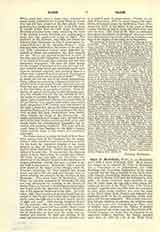

Clare of Montefalco, Saint, b. at Montefalco about 1268; d. there, August 18, 1308. Much dispute has existed as to whether St. Clare of Montefalco was a Franciscan or an Augustinian; and while Wadding, with Franciscan biographers of the saint, contends that she was a member of the Third Order of St. Francis, Augustinian writers, whom the Bollandists seem to favor, hold that she belonged to their order. It seems, however, more probable to say that St. Clare, when she was still a very young girl, embraced the rule of the Third Order of St. Francis (secular), together with her older sister and a number of other pious young maidens, who wore the habit of the Third Order of St. Francis and followed that particular mode of life in community which their piety and fervor suggested. When later, however, they became desirous of entering the religious state in its strict sense, and of professing the three vows of religion, they petitioned the Bishop of Spoleto for an approved rule of life; and, the Third Order of St. Francis (regular) not being then in existence as an approved religious institute, the bishop imposed upon them in 1290 the rule of the Third Order (regular) of St. Augustine. From her very childhood, St. Clare gave evidence of the exalted sanctity to which she was one day to attain, and which made her the recipient of so many signal favors from God. Upon the death of her older sister in 1295, Clare was chosen to succeed her in the office of abbess of the community at Santa Croce; but it was only in obedience to the command of the Bishop of Spoleto that she could be prevailed upon to accept this new dignity. Kind and indulgent towards others, she treated herself with the most unrelenting severity, multiplying her fasts, vigils, and other austerities to such an extent that at one time her life was even feared for. To these acts of penance she added the practice of the most profound humility and the most perfect charity, while the suffering of her Redeemer formed the continual subject of her meditation. Shortly after the death of St. Clare, inquiry into her virtues and the miracles wrought through her intercession was instituted, preparatory to her canonization. It was not, however, until several centuries later that she was canonized by Pope Leo XIII in 1881.
STEPHEN M. DONOVAN

